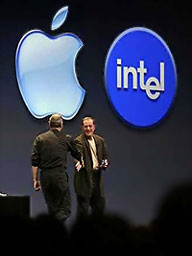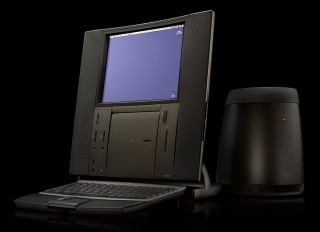1999: The idea of an iMac with “Intel inside” is both more and less ludicrous than it sounds.
Source of the Rumor, #1

Intel x86 CPUs in Macs? It finally happened in 2006.
Quite frankly, Intel is tired of having its future tied too closely to Microsoft’s. Sure, we’ve called the platform “Wintel” for years, but that isn’t quite the reality.
On the one hand, the Wintel world is dominated by Windows and Intel, but there are competitors. Linux, BSD, BeOS, OS/2, and a handful of other operating systems are being used on computers designed as Windows platforms. Further, a good percentage of Wintel computers don’t have Intel inside; instead, they have chips from AMD, Cyrix, or one of the other Intel alternatives.
On the other hand, both Microsoft and Intel are active outside of the “Wintel” world. Windows NT runs on the Alpha chip, among others. Windows CE runs on ARM CPUs. And at one point, Microsoft even announced its intention to port Windows to the PowerPC platform.
Back when PowerPC was brand new, the idea was to have Mac OS, IBM OS/2, and Windows NT available to run on standard PPC hardware.
Likewise, Intel has always made chips outside of the 80×86 family. Intel makes some very powerful RISC chips and is working on a next-generation 64-bit CPU to eventually displace the Pentium family: Merced (a.k.a. IA-64, later named Itanium).
MacWeek reports that Intel is “courting” Apple to port OS X to Merced. At the same time, Intel is funding Linux development for its forthcoming CPU.
Intel doesn’t want the success or failure of Merced to depend on Windows.
Source of the Rumor, #2
Dell does intend to make a computer it will market as an iMac clone. But it won’t run the Mac OS; it will be a Wintel computer that just looks like an iMac.
Speculation #1

Mac OS X officially arrived in March 2001.
When it arrives, Mac OS X will be far more platform independent than the old Mac OS. It will be much easier to port the kernel and applications to other platforms. Although Apple at one time created an Intel port of System 7.x (“Star Trek”), Apple realized that it could never make a dent in the Windows world.
Perform a simple recompile of your application from the PowerPC version of OS X to the Merced version, and you can sell your application on that platform as well.
Considering the troubles Microsoft has been through in the recent past (losing the Java case to Sun, the Melissa virus, and possibly being dismantled by the Department of Justice) and Microsoft’s tendency to throw its weight around, few could blame Intel for looking into alternative operating systems for its next CPU family.
After all, without an OS, a CPU really doesn’t have anything to do. Nor does it have a market.
Speculation #2
Apple has a lot to gain by creating a cross-platform operating system. This is little different than what Microsoft has done with Windows, which is available for Intel, Alpha, and other CPUs, or Linux developers have done with Linux.
If Microsoft should drop the ball on Windows 2000 for Merced, Linux and Mac OS X would have a head start at becoming the dominant OS for that processor. Microsoft could end up the also-ran for once.
Speculation #3
Apple will probably never release a version of the Mac OS for the current Intel x86 family of processors. Windows NT is too firmly entrenched on the server end, and the consumer market has shown no desire to abandon Windows 95/98.
Thus, there will never be an Apple computer with a Pentium, unless the chip is on a DOS card.
Speculation #4
There will be iMac clones. They will look like iMacs, be marketed like iMacs, and have all the failings of Windows.
These so-called clones will be what Dell is proposing: Windows computers with iMac looks and features. We’ll see curvaceous cases without floppy drives, motherboards with USB but no serial or parallel ports, and an internal WinModem (see my article on the GeoPort for all the reasons that this is a bad idea).
They probably won’t have ethernet as a standard feature – the Wintel world still doesn’t see networking as an essential feature of a computer.
And to top it all off, they’ll probably ship with Windows 2000 Beta 3.
Yes, you read that right, Beta. Several PC manufacturers have committed to releasing new computers with beta versions of Windows 2000. I wonder how many customers will be willing to buy new hardware with an unfinished operating system?
But that isn’t as bad as it sounds. If you look at Microsoft history, every piece of software seems to be released in late beta and later be fixed with service packs that correct the worst problems.
Speculation #5
But Apple isn’t standing still. The Mac OS and the iMac both exhibit a level of integration unknown in the Wintel world. Macs have always been smart enough to automatically mount floppies, CDs, and other types of drives to the desktop. The OS and hardware have a synergy that goes well beyond the sum of the parts.
 So when the Wintel iMacalikes arrive, Apple will have the next generation iMac ready to go (see C2, the Next iMac). And before they catch up to that, we may see Apple abandon the iMac for something even more revolutionary.
So when the Wintel iMacalikes arrive, Apple will have the next generation iMac ready to go (see C2, the Next iMac). And before they catch up to that, we may see Apple abandon the iMac for something even more revolutionary.
What might that be?
My guess is something more akin to the 20th Anniversary Macintosh than to bulky iMacs with built-in tube-based displays.
Conclusion
The future of the Macintosh and the Mac OS may be very different from what we envisioned a few years ago when Apple embraced the idea of clones. Apple rapidly discovered that it couldn’t compete with Mac clones when it had to bear all the Mac OS development costs.
By moving toward a platform-independent operating system, OS X could be available to a wider base of computers than just those that Apple makes. OS X for Merced could be a strong step for Apple increasing market share while keeping genuine Mac clones at bay.
Apple will continue to lead the industry in cutting-edge design. The Mac OS and Macintosh computers have always been innovative, rarely copycats. That is unlikely to change – after all, this is the company that thinks different.
The idea of iMac clones is both less and more ludicrous than it sounds.
Looking Back: Who would have believed that Apple was porting Mac OS X to Intel x86 CPUs as well as PowerPC processors the entire time?
keywords: #imac #intelinside #intelmacs
short link: https://goo.gl/4NUmpF

